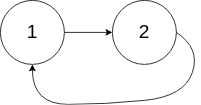Problem: Is linked list a palindrome?
SOLUTION
Store the characters int he array and use two pointer method to check if it is a plaindrome
# Definition for singly-linked list. # class ListNode: # def __init__(self, val=0, next=None): # self.val = val # self.next = next class Solution: def isPalindrome(self, head: ListNode) -> bool: arr = [] walker = head while walker!=None: arr.append(walker.val) walker = walker.next i = 0 j = len(arr)-1 while(i < j): if arr[i]!=arr[j]: return False i+=1 j-=1 return True
Problem: Detect Linked List Cycle
Given head, the head of a linked list, determine if the linked list has a cycle in it.
There is a cycle in a linked list if there is some node in the list that can be reached again by continuously following the next pointer. Internally, pos is used to denote the index of the node that tail's next pointer is connected to. Note that pos is not passed as a parameter.
Return true if there is a cycle in the linked list. Otherwise, return false.
Example 1:

Input: head = [3,2,0,-4], pos = 1 Output: true Explanation: There is a cycle in the linked list, where the tail connects to the 1st node (0-indexed).
Example 2:

Input: head = [1,2], pos = 0 Output: true Explanation: There is a cycle in the linked list, where the tail connects to the 0th node.
Example 3:

Input: head = [1], pos = -1 Output: false Explanation: There is no cycle in the linked list.
Constraints:
- The number of the nodes in the list is in the range
[0, 104]. -105 <= Node.val <= 105posis-1or a valid index in the linked-list.
Follow up: Can you solve it using O(1) (i.e. constant) memory?
SOLUTION:
it's important to clarity if the values in the linked list can repeat, in this case they can
keep a running set of visited nodes
walk through linked list checking at each node if it is in the visited set
# Definition for singly-linked list. # class ListNode: # def __init__(self, x): # self.val = x # self.next = None class Solution: def hasCycle(self, head: ListNode) -> bool: visited = set() walker = head while walker is not None: if walker in visited: return True visited.add(walker) walker = walker.next return False